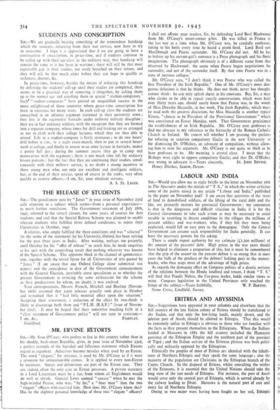MR. ERVINE RETORTS SIR, —Mr. Sean O'Casey, who prefers to live
in this country rather than in his shoddy, back-street Republic, gives, in your issue of November 23rd, a perfect example of the lopsided and fallacious statement which Eireans regard as argument. Adjectives become missiles when used by an Eirean. The word "elegant," for instance, is used by Mr. O'Casey as if it were a synonym for unmentionable crimes. It is applied to every non-Eirean he mentions. Sneers and defamation are part of the Eirean case. They are, indeed, often the only case an Eirean possesses. A private secretary to a Lord Lieutenant must be a liar, from whom all Englishmen would do well to shrink. General Lowe seemed " uneasy " when he met the high-minded Pearse, who was, "by far," a "finer man" than the two " elegant " officers whet received him. How does Mr. O'Casey know this? I-las he the slightest personal knowledge of these two " elegant " officers?
I shall not affront your readers, Sir, by defending Lord Basil Blackwood from Mr. O'Casey's street-corner gibes. He was killed in France in the last war at a time when Mr. O'Casey was, he candidly confesses, taking to his heels every time he heard a pistol fired. Lord Basil saw MacDonagh and Pearse surrender. Mr. O'Casey did not. All he has to bolster up his servant-girl's romance is a Press photograph and his florid imagination. The photograph obviously is of a different scene from that observed by Blackwood: the scene when Pearse began negotiations for surrender, and not of the surrender itself. By that time Pearse was in a state of nervous collapse.
Mr. O'Casey says, "I don't think it was Pearse who was called the first President of the Irish Republic." One of Mr. O'Casey's most dan- gerous delusions is that he thinks. He does not think, never has thought. cannot think: he can only splash about in his emotions. But, Sir, a man who claims to be able to repeat exactly conversations which were held over thirty years ago, should surely know that Pearse was, in the words of Miss Dorothy Macardle, in her work, The Irish Republic, which must be read with the greatest discretion, for Miss Macardle is another typical Eirean, "chosen to be President of the Provisional Government" which was constituted on Easter Monday, 1916. That Government proclaimed the establishment of an Irish Republic. Mr. O'Casey next professes to find me obscure in my reference to the hierarchy of the Roman Catholic Church in Ireland. He cannot tell whether I am praising the prelates for refusing to sanction compulsory Gaelic in the new University or for dismissing Dr. O'Hickey, an advocate of compulsion, without allow- ing him to state his argument. Mr. O'Casey is not quite so thick as he here professes to be. My meaning is crystal clear. I mean that the Bishops were right to oppose compulsory Gaelic, and that Dr. O'Hickey was wrong to advocate it.—Yours sincerely, ST. JOHN ERVINE. Honey Ditches, Seaton, Devon.






























 Previous page
Previous page